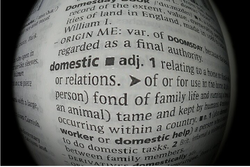
A consultation on the definition of domestic violence is being launched by the government today. The main point of discussion is whether or not the definition should include the term ‘coercive control’. In addition to psychological abuse the government will be looking at widening the definition to include under-18s
The current definition of government definition of domestic violence is:
“any incident of threatening behaviour, violence or abuse [psychological, physical, sexual, financial or emotional]4 between adults who are or have been intimate partners or family members, regardless of gender or sexuality.”
The current definition of government definition of domestic violence is:
“any incident of threatening behaviour, violence or abuse [psychological, physical, sexual, financial or emotional]4 between adults who are or have been intimate partners or family members, regardless of gender or sexuality.”
The Welsh Government has a wider definition that takes into account emotional abuse, stalking and violence witnessed by children.
Domestic abuse survivor Vicky spoke to Sarah Montague this morning on BBC Radio 4’s Today programme. Vicky had been in an abusive marriage for 10 years, the abuse began as physical until her husband was arrested and charged.
Vicky’s husband was then allowed to return to the family home and his abuse switched from physical to psychological. Vicky and her 3 children modified their behaviour in turn to be pleasing to him.
Sarah Montague asked why Vicky did not leave. “I’ve been asked that many times, his behaviour was…I felt like it was normal”.
Discussing if she sought help Vicky recounted how people had told her “at least he’s not putting you in hospital”. It was not until her younger sister told her the family set up “was wrong” that Vicky stopped thinking the abuse was “my problem and my fault”.
When asked about the domestic violence definition including ‘coercive control’ Vicky considered it an valuable addition. “It is important that women understand this is abuse…you don’t have to be hit… to be abused”.
Diana Barran, chief executive of Co-ordinated Action Against Domestic Abuse was also interviewed by Sarah Montague, saying: "People are completely controlled in all of their daily activities, prevented from taking their medication, prevented from seeing any friends, controlled what they wear, who they talk to, literally on every single level, and sometimes almost kept kidnapped in their home."
All too often men and women suffer this form of psychological abuse which goes unrecognised as abuse by friends and family. If they do view it as abuse it is still very hard to confront either the victim or perpetrator about.
Home Secretary Theresa May points out that: “On average two women are murdered by their current or former partner each week. Each year around 1.2 million women suffer domestic violence. Around one in four women will experience domestic abuse in their lifetime, often accompanied by years of psychological abuse.”
Unfortunately the widening of the definition could be for nothing. Labour MPs are arguing the redefinition is pointless if the government in turn insists on increasing the level of proof required before legal aid can be agreed upon.
Under the forthcoming Legal Aid and Sentencing Bill victims of domestic violence seeking legal aid will not qualify unless they can provide evidence of “a high risk of violence”.
The review is on-going until March 2012.
Kate
Domestic abuse survivor Vicky spoke to Sarah Montague this morning on BBC Radio 4’s Today programme. Vicky had been in an abusive marriage for 10 years, the abuse began as physical until her husband was arrested and charged.
Vicky’s husband was then allowed to return to the family home and his abuse switched from physical to psychological. Vicky and her 3 children modified their behaviour in turn to be pleasing to him.
Sarah Montague asked why Vicky did not leave. “I’ve been asked that many times, his behaviour was…I felt like it was normal”.
Discussing if she sought help Vicky recounted how people had told her “at least he’s not putting you in hospital”. It was not until her younger sister told her the family set up “was wrong” that Vicky stopped thinking the abuse was “my problem and my fault”.
When asked about the domestic violence definition including ‘coercive control’ Vicky considered it an valuable addition. “It is important that women understand this is abuse…you don’t have to be hit… to be abused”.
Diana Barran, chief executive of Co-ordinated Action Against Domestic Abuse was also interviewed by Sarah Montague, saying: "People are completely controlled in all of their daily activities, prevented from taking their medication, prevented from seeing any friends, controlled what they wear, who they talk to, literally on every single level, and sometimes almost kept kidnapped in their home."
All too often men and women suffer this form of psychological abuse which goes unrecognised as abuse by friends and family. If they do view it as abuse it is still very hard to confront either the victim or perpetrator about.
Home Secretary Theresa May points out that: “On average two women are murdered by their current or former partner each week. Each year around 1.2 million women suffer domestic violence. Around one in four women will experience domestic abuse in their lifetime, often accompanied by years of psychological abuse.”
Unfortunately the widening of the definition could be for nothing. Labour MPs are arguing the redefinition is pointless if the government in turn insists on increasing the level of proof required before legal aid can be agreed upon.
Under the forthcoming Legal Aid and Sentencing Bill victims of domestic violence seeking legal aid will not qualify unless they can provide evidence of “a high risk of violence”.
The review is on-going until March 2012.
Kate
 RSS Feed
RSS Feed
